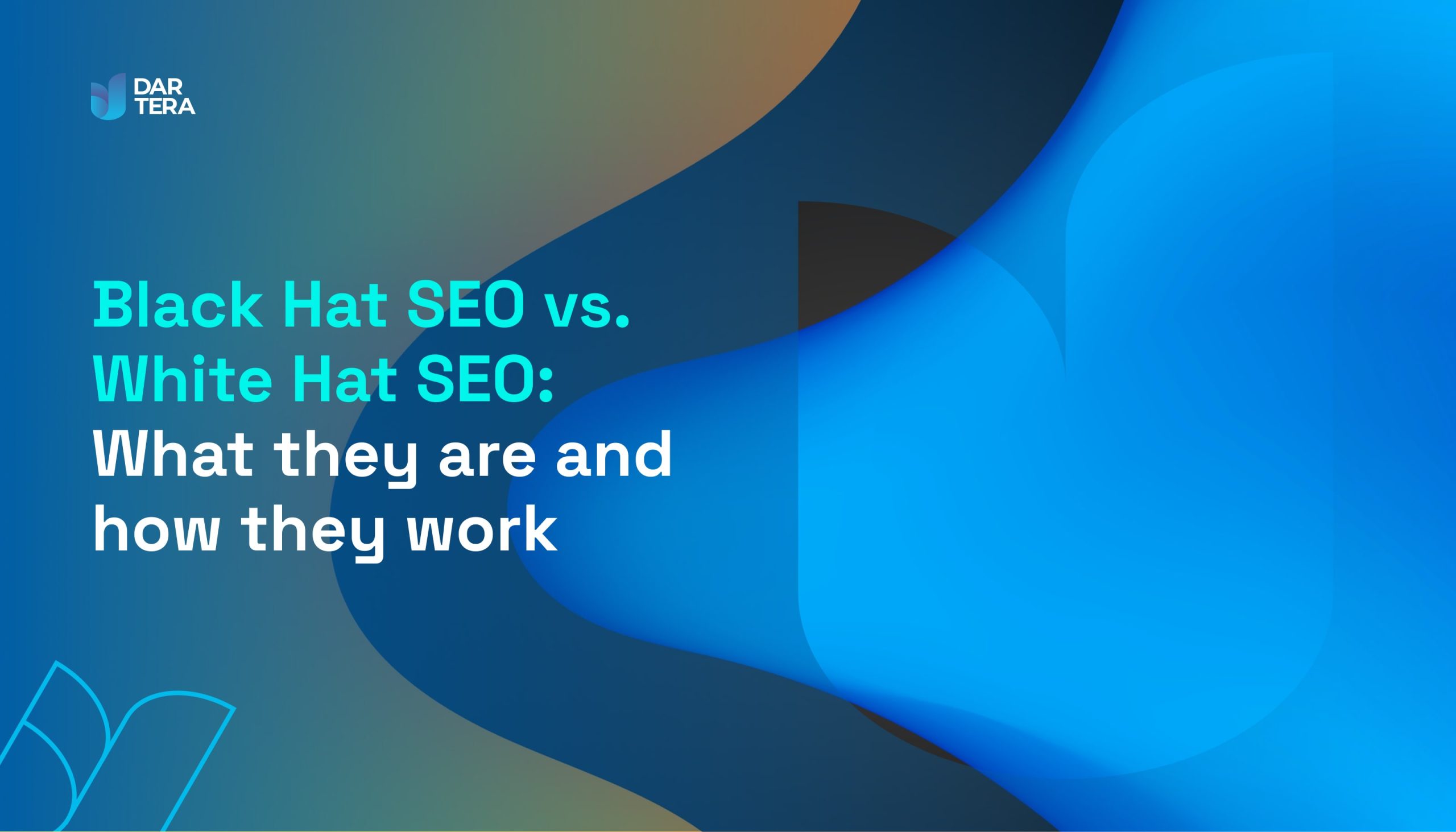Black Hat SEO vs. White Hat SEO: What they are and how they work

White-hat and black-hat search engine optimization (SEO) techniques aim at the same thing at their core: good results for a website in the search engines. Both techniques aim to make a website rank higher when one or more search queries are entered. If a website then has greater visibility - i.e., ranks on or near the first page - people are more likely to visit the site, and the site should therefore generate a higher ROI.
However, there is a huge difference between the two: Black hat tactics are used to trick the system, while white hat practices work within the system to achieve the best, sustainable results. One is the child who cheats his way through school; the other is the student who strives to improve his knowledge and the quality of his work in order to get the best grades.

What is Black Hat SEO?
Black Hat SEO is a set of illegal or unethical practices used by an individual or group of individuals to improve search engine results for a website or group of websites.
The black hat strategy maximizes short-term gains for a website by exploiting gaps, limitations, or blind spots in search engine algorithms. This often leads to spammy practices that are bad for users.
These practices change over time as search engines have seen through black hat methods. Here are some of the most common techniques that belong to black hat methods:
- Keyword stuffing: websites want to rank for specific keywords. Keyword stuffing involves creating web pages and content with an exaggerated amount of keywords to send boosted keyword signals to search engines. This should result in the website ranking well for the keywords.
- Hidden keywords: Similar to keyword stuffing, keyword hiding involves changing the font color of a text so that it becomes invisible to the human eye. The invisible keywords are meant to entice a search engine to give the web page and associated website a good search engine ranking.
- Spamming links in comment boxes and forum posts: The Internet is a web of hyperlinks. To try to manipulate search engines with links, black-hat SEO practitioners have been known to include links to websites in comment fields of blog posts and in forums, believing that these links will send positive signals to search engines.
- "Link Schemes": Google lists a number of link schemes that violate the Webmaster Guidelines. These include using automated programs to build links to a website, offering a free product in exchange for a positive review and a link, and "excessive link exchange," in which websites exchange links with each other for free.
- Misleading redirects: If a web page is outdated or broken, a webmaster may redirect the user to another page. A misleading redirect sends the user to a page where they see different content than what a search engine's web crawler can read.
- Automated Content/Scraped Content: This is bot-created content that is often "gibberish" to fool the search engines.
- Cloaking: Similar to misleading redirects, cloaking is about showing the user different content than the search engine bots.
There are many other black hat practices that all have the same goal: To deceive search engines so that a website gets a better ranking than it deserves.
Why do people still use black hat SEO techniques?
Some people use black hat tactics because they assume they can fool search engines, whether that's true or not.
Algorithms have blind spots. Black hat strategies are used to exploit blind spots and make a quick profit and easy money. Those who use black hat techniques do not want to add value to Internet users. These individuals may not think about the consequences, or they may not care about the consequences, or they may think that they are acting in a way that they can avoid the consequences.
Black Hat SEO und Google Algorithmus Updates
Since Google controls over 90 percent of the search engine market, Black Hat SEO tactics are primarily aimed at manipulating Google. Originally, this was a problem for Google until the search engine giant released the Penguin algorithm update in 2012.
Penguin reflected a new mindset from Google. Google believes that the best way to minimize or even eradicate Black Hat SEO is to regularly update its entire algorithm to make Black Hat tactics ineffective.
Penguin took manipulative tactics into account and introduced an algorithm to penalize websites that used these tactics. If you were a webmaster or SEO specialist of a website that used black hat tactics in April 2012, you experienced a huge change when Penguin took your web pages out of the picture. Suddenly, traffic dropped and revenue plummeted.
Black Hat SEO and Google Algorithm Updates
Since Google controls over 90 percent of the search engine market, Black Hat SEO tactics are primarily aimed at manipulating Google. Originally, this was a problem for Google until the search engine giant released the Penguin algorithm update in 2012.
Penguin reflected a new mindset from Google. Google believes that the best way to minimize or even eradicate Black Hat SEO is to regularly update its entire algorithm to make Black Hat tactics ineffective.
Penguin took manipulative tactics into account and introduced an algorithm to penalize websites that used these tactics. If you were a webmaster or SEO specialist of a website that used black hat tactics in April 2012, you experienced a huge change when Penguin took your web pages out of the picture. Suddenly, traffic dropped and revenue plummeted.
Since then, Google has made many more updates, some big, some not so big. Google makes updates to improve user experience (UX) and uses human Search Quality Evaluators to score pages based on a set of guidelines.
These reviews help inform and train Google's algorithms. Since black-hat SEO does not optimize UX, every Google update targets black-hat SEO tactics. The Panda algorithm, for example, which has undergone 28 updates over four years, downgrades websites in search engine results pages (SERPs) that have poor quality content and too many ads.
The goal is to reward websites that provide users with a high-quality experience.
How Black Hat SEO harms websites
Websites that perform Black Hat SEO can be penalized with various types of penalties:
- Algorithm deprioritization: once Google's algorithms crawl the website and register the signals that other websites send to it, the website may experience a significant drop in rankings, which means that it is practically buried in Google's list SERPs.
- Black listing: If the black hat practices of a website are very serious, Google may remove the website from the index completely.
In both cases, Google does not notify the sites. Sites that are blocked or deprioritized will need to find out for themselves by searching for their own site in Google or via notifications in their Google Search Console.
When you are looking for SEO services, there are some red flags 🚩 by which you can recognize potential Black Hat SEO companies. These red flags include:
- There is no transparency and/or they do not clearly explain what they intend to do for you.
- They promise thousands of links in a short period of time.
- They claim to have a relationship with Google.
- Or they guarantee a ranking at number 1.
Stay away from any agency that exhibits this type of behavior.

What is White Hat SEO?
White hat SEO is a set of ethical, technical, and aesthetic practices that an individual or group of individuals employs to improve search engine results for a website or group of websites. White hat SEO describes the bulk of the best SEO practices of reputable companies.
White hat practices focus on improving the quality of a website. They also focus on sending the right signals to Google so that the search engine can recognize the purpose and authority of a website.
White Hat SEO specialists take into account Google's quality guidelines, the guidelines of other search engines, and the cornerstones of a good user experience. In this way, they optimize a website both for human purposes and for the search engine algorithm.
White Hat SEO Techniques
White Hat SEO starts with an analysis of a website and its competitors. It's about finding gaps and problems with the signals your website sends to search engines. The goal is to fix these problems so that search engines and users find your site useful for their purposes.
For example, an analysis may reveal that your competitor has more informative blog posts on a keyword or set of keywords that you are trying to rank for. This content is important because it is highly relevant to your niche. Writing meaningful articles in your niche is called content marketing.
Google's focus on content usefulness means that a well-thought-out content marketing strategy is one of the biggest SEO factors you can do yourself. In a situation where content marketing is insufficient, white hat SEO specialist will help you create more content to satisfy users' queries related to your keywords.
Here are some of the most important white hat techniques:
- Content Optimization: You can optimize any content on your website to suit its purpose. First and foremost, it must be linkable content that piques users' interest because it is informative or even entertaining. Content optimization is about creating new content and revising old content to appeal to a specific audience. Search engines register the increase of relevant, authoritative and high-quality content and reward your website accordingly.
- Technical SEO: Your website's metastructure, internal links, tags and keyword usage are just some of the aspects that determine the technical value of your website. Website SEO audit services evaluate all technical issues and opportunities for improvement. Websites that improve their technical value often experience an almost immediate boost in SERPs.
- Link Building: Link building is about sharing your useful content with other websites. Google and other search engines positively value relevant links that help users find what they are looking for on resource pages and blog posts. Unlike promotional, keyword-optimized linking practices that Google discourages, white hat link building focuses on sharing information to let users and search engines know where you belong in the broader context of the web. When search engines see that these links are sending signals from mass external websites, it can lead to an increase in rankings.
White Hat SEO focuses on organic, evergreen strategies that improve your rankings over time. This is not a quick win, but a big win. White Hat SEO is a way to work with search engines and users who want to know the value of your website, product or service.
Why White Hat SEO is worth the time
White Hat SEO is worth the time and money for several reasons.
First, you feel good about what you are offering users. It's like you're presenting a store where everything is clearly labeled and organized. The aisles and shelves are clean, the merchandise is well-stocked, and the salespeople are friendly and informative without being pushy.
Second, white hat SEO ensures success and a solid ROI in the long run. A white hat strategy does not attempt to manipulate Google's search algorithm - instead, it bullet-proofs your website and prepares it for future algorithm changes. If your website is sending the right signals, the inevitable algorithm changes will result in better rankings.
Third, your business grows as your website grows. White Hat SEO is about focusing on your value proposition. If you focus on providing maximum value through your website, every aspect of your business can only follow.








